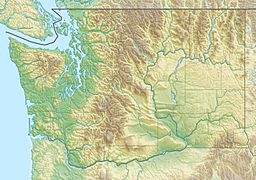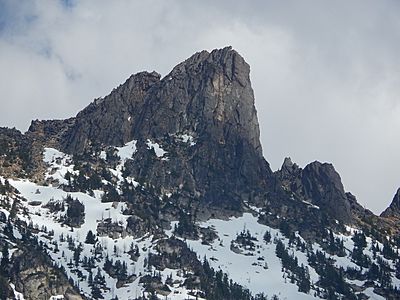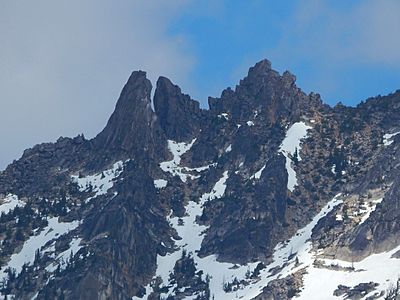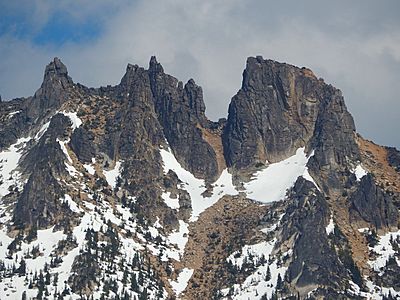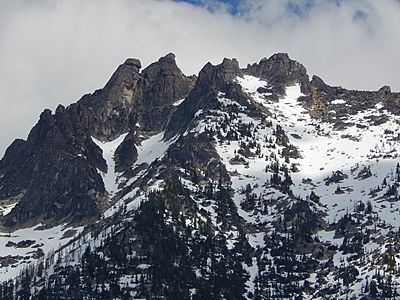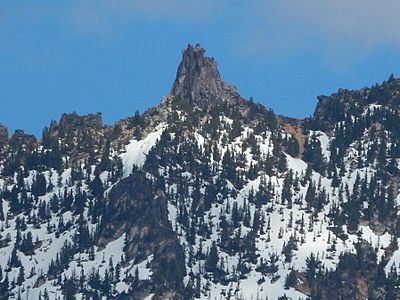Vasiliki Ridge facts for kids
Quick facts for kids Vasiliki Ridge |
|
|---|---|
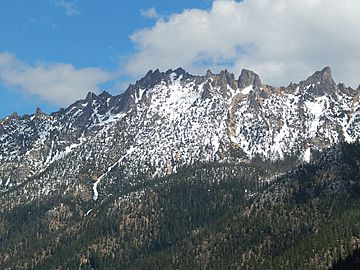
Vasiliki seen from North Cascades Highway near Washington Pass
|
|
| Highest point | |
| Elevation | 8,330 ft (2,540 m) |
| Prominence | 390 ft (120 m) |
| Geography | |
| Location | Washington, U.S. |
| Parent range | North Cascades |
| Topo map | USGS Silver Star Mountain |
| Type of rock | Granite |
| Climbing | |
| First ascent | May 31, 1952 Fred Beckey, Herb Staley |
| Easiest route | Climbing |
Vasiliki Ridge is a long ridge, about three miles (4.8 km) in length. It is located in Okanogan County in Washington state. This ridge is part of the Methow Mountains, which are a smaller group of mountains within the larger North Cascades range.
Vasiliki Ridge sits north of Silver Star Mountain. It is on land managed by the Okanogan National Forest. A famous climber named Fred Beckey suggested the name "Vasiliki." He was also one of the first people to climb it in 1952. You can see Vasiliki Ridge from Washington Pass and from the North Cascades Highway.
The highest point on Vasiliki Ridge is its summit, which is 8,190 feet (2,496 meters) high. The ridge has several cool rock towers made of granite. Some of these towers have names like Charon Tower, The Acropolis, Ares Tower, Vasiliki Tower, Juno-Jupiter Towers, Aphrodite Tower, and Baccus Tower. Rain and melting snow from the ridge flow into Early Winters Creek, which then joins the Methow River.
Understanding the Climate of Vasiliki Ridge
Weather systems from the Pacific Ocean often move northeast towards the Cascade Mountains. When these weather fronts reach the North Cascades, the tall peaks force the air to rise. As the air goes higher, it cools down and drops its moisture. This causes a lot of rain or snowfall on the mountains. This process is called Orographic lift.
Because of this, the western side of the North Cascades gets a lot of precipitation. This is especially true during the winter months, when most of it falls as snow. In winter, the weather is usually cloudy. However, during the summer, high-pressure systems over the Pacific Ocean often bring clear skies with little or no clouds. The influence of the ocean means the snow tends to be wet and heavy. This can lead to a high risk of avalanches.
Exploring the Geology of the North Cascades
The North Cascades region has some of the most rugged and dramatic landscapes in the Cascade Range. You can see sharp, rocky peaks, long ridges, and deep valleys carved by glaciers. These amazing landforms and big changes in elevation were created by geological events that happened millions of years ago. These changes also led to different climates in various areas, which in turn created different types of plant life, or ecoregions.
The Cascade Mountains started forming millions of years ago, during the late Eocene Epoch. At that time, the North American Plate was slowly moving over the Pacific Plate. This movement caused many periods of volcanic activity. Also, small pieces of the Earth's crust, called terranes, joined together to form the North Cascades about 50 million years ago. Vasiliki Ridge itself is mostly made from granite that comes from a large underground rock formation called the Golden Horn batholith.
During the Pleistocene period, which began over two million years ago, huge sheets of ice called glaciers repeatedly moved across the land. As they advanced and then melted back, they scraped away the landscape and left behind piles of rock debris. The "U"-shaped valleys you see in the rivers today are a direct result of these recent glaciers. The combination of land being pushed up (uplift) and cracks forming in the Earth's crust (faulting), along with the action of glaciers, has shaped the tall peaks and deep valleys of the North Cascades area.
Gallery


